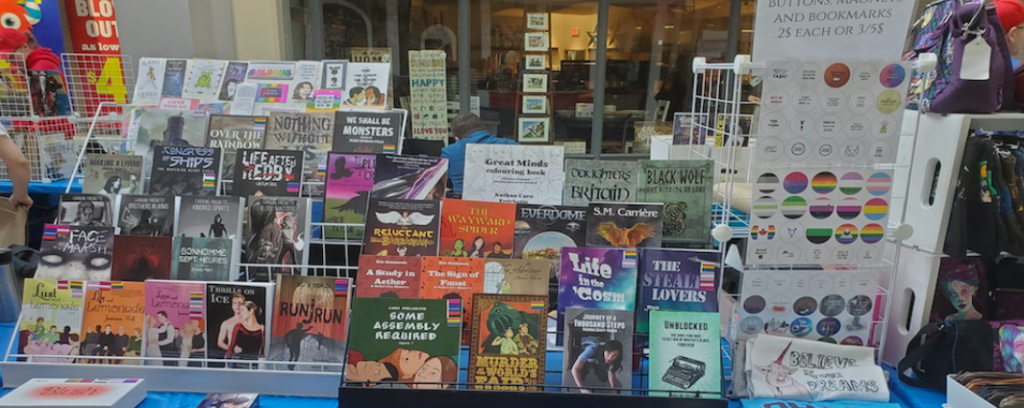Renaissance Press diversifies genre publishing with queer and disabled voices
by Roxane Hudon
Fantasy, horror, mystery… these are genres that overpopulate bookshelves with mass-produced paperbacks, often dominated by just a handful of very popular writers. It’s definitely a crowded world for fantastical beasts and thrilling whodunits, but Renaissance Press, a small and independent Gatineau-based publishing press, isn’t afraid to roll up its sleeves and elbow its way in, armed with fresh voices and unique perspectives representing the intersectionality between queer and disabled voices.
That wasn’t the press’s initial mandate when Nathan Fréchette co-founded it with Marie-Claude Goulet and Marjolaine Lafrenière in 2013. A former creative writing teacher, Fréchette organized a literary critique group with a few students. When one of them scored a publishing deal with a major publishing house, they were all shocked at the deal’s contract terms. “They were not author-friendly at all and she turned it down. And we thought: why not publish it ourselves?” The name Renaissance stemmed from the concept of a “Renaissance man,” because “we do it all,” affirms Fréchette. While the initial goal was to publish each other’s works in a manner they deemed fair, they became naturally drawn to books that were harder to categorize in existing genres, or “voices that were being ignored,” says Fréchette.
As a transgender queer man dealing with mobility issues of his own, lack of representation in the genres he loved, but also in the publishing world in general, is something Fréchette noticed first-hand. “There was a huge need for disabled voices and writers. Publishers just don’t know how to market stories about disabled people. They’re often afraid of being criticized.” Since many of Renaissance’s staff and writers manage disabilities of their own, accessibility is also top of mind for the publishers. “Sixty to seventy per cent of book launches and events are not accessible for us or our writers. We don’t have an office and worked from home before the pandemic. Working from home is a huge asset for disabilities,” he explains. While the pandemic-induced shift to virtual events might have sometimes been a technical nightmare for many publishers and authors, Fréchette says it’s been “fantastic for mobility issues,” and he hopes to maintain some kind of hybrid form of online and in-person talks or launches moving forward.

Stories about and by marginalized voices serve as the common thread for all books published by Renaissance Press, which vary greatly in genre, but tend to lean heavily towards speculative fiction. The perfect example of this is a multi-genre anthology titled Nothing Without Us, which Fréchette quickly names first when I ask him where a new reader should start when faced with Renaissance’s diverse catalogue. It compiles short stories featuring protagonists with different disabilities: Deaf, neurodivergent, managing a mental or chronic illness, and more. Submissions for a sequel, Nothing Without Us Too, open in September of this year, with guidelines explaining that they “want to read these stories because diversity is reality, and should be so, even in fantastical or other speculative fiction settings.”
Like many other publishers, the pandemic proved to be a difficult but somehow prolific time for Renaissance Press. (Read our recent article on publishing during and after the pandemic.) Fréchette tells me they had to reject at least half the submissions received, due to sheer volume. Some of the upcoming titles from the press include Artificial Divide, another short story anthology focusing on the experience of blind or visually impaired protagonists and writers. It will also be released as an audiobook and, eventually, in Braille. AfriCANthology: Perspectives of Black Canadian Poets, coming out in winter 2022, showcases the experience of being a Black Canadian artist by gathering testimonials from poets across Canada. They will also be dipping into the world of children’s literature with the release of their first kids’ book, Sonia Saikaley’s Samantha’s Sandwich Stand, about a young Lebanese girl selling sandwiches and illustrated by Fréchette himself.
Beyond diversifying their catalogue of books, Fréchette says Renaissance Press is also expanding upon their love of geek culture and board games by making their own games. So far, they have created three card games, including one based on Fréchette’s own Family by Choice series of books, a Jane Austen-based storytelling game, and Blush, a card game designed to facilitate how parents explain sex to their kids. He even hopes to develop their very first tabletop role-playing game in the future—move over, D&D.
With submissions currently closed, Fréchette hopes to receive more new perspectives, genres, and voices when they open back up in spring 2022 – because if you don’t feel represented by the books you love, then you can always write your own way in.
Roxane Hudon is a full-time writer and frequent layabout. Currently a corporate sell-out/ “content creator,” but also a punk zine-maker, she has very strong opinions about very few things, including movies, books, Russia, and Harry Styles.